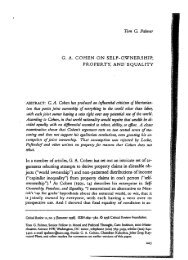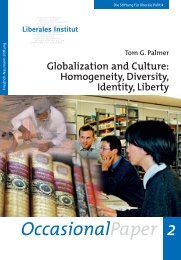Are Patents and Copyrights Morally Justified? - Tom G. Palmer
Are Patents and Copyrights Morally Justified? - Tom G. Palmer
Are Patents and Copyrights Morally Justified? - Tom G. Palmer
Create successful ePaper yourself
Turn your PDF publications into a flip-book with our unique Google optimized e-Paper software.
No. 3] <strong>Are</strong> <strong>Patents</strong> <strong>and</strong> <strong>Copyrights</strong> <strong>Morally</strong>Just~fied? 831<br />
argue that any form of property limits liberty in some way, Jan<br />
Narveson responds:<br />
This is to talk as though the ‘restrictions’ involved in ownership<br />
were nothing but that. But that’s absurdi The essence of<br />
my having an Apple Macintosh is that I have one, at my disposal<br />
when<strong>and</strong> as I wish, which latterof course requires that<br />
you not be able simply to use it any time you like; it’s not that<br />
you can’t have one unless I say so.52<br />
My ownership claim over my computer restricts your access to<br />
that computer, but it is not a blanket restriction on your liberty<br />
to acquire a similar computer, or an abacus, or to count on<br />
your fingers or use pencil <strong>and</strong> paper. In contrast, to claim a<br />
property right over a process is to claim ablanket right to control<br />
the actions of others. For example, if a property right to<br />
the use of the abacus were to be granted to someone, it would<br />
mean precisely that others could not make an abacus unless<br />
they had the permission of the owner of that right. It would be<br />
a restriction on the liberty of everyone who wanted to make an<br />
abacus with their own labor out ofwood that they legitimately<br />
owned. This is a restriction on action qualitatively different<br />
from the restriction implied in my ownership of a particular<br />
abacus.<br />
The previous paragraph illustrates that intellectual property<br />
rights are not equivalent to other property rights in “restricting<br />
liberty.” Property rights in tangible objects do not restrict liberty<br />
at all—they simply restrain action. Intellectual property<br />
rights, on the other h<strong>and</strong>, do restrict liberty.<br />
Arguments from self-ownership, including Spooner’s (but<br />
perhaps not R<strong>and</strong>’s), hinge upon the idea of liberty. As I argued<br />
above, there is no reason that a number ofdifferent arguments<br />
might not be marshalled in favor of property. Locke’s<br />
argument for labor as the foundation of property has three<br />
principal pillars: (1) Having established the right to property in<br />
oneself, how can we determine when something hai become<br />
“so his, [that is], a part of him, that another can no longer have<br />
any right to it?” 53 The annexation of labor is the relevant point<br />
at which a thing becomes owned <strong>and</strong> therefore assimilated to<br />
52. J. NARVESON, THE LIBERTARtAN IDEA 77 (1988). For a liberty-basedargument for<br />
property by Narveson, see id~at 62-93. But see Kelly, L~fe~Liberty <strong>and</strong> Property, in HUMAN<br />
Riosrrs 108.18 (1984).<br />
53. J. LOCKE, supra note 42, at 305. -











